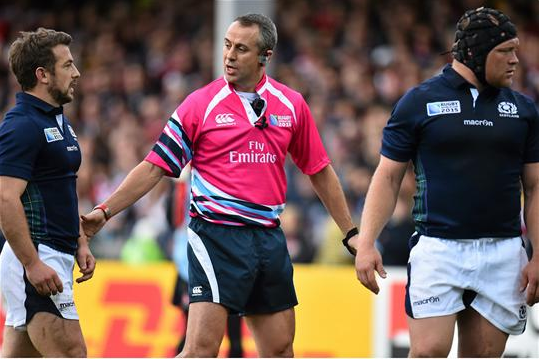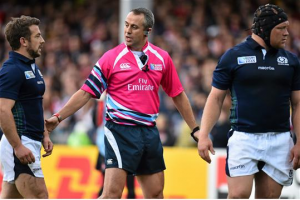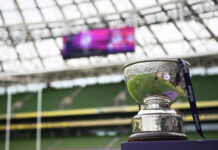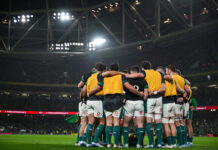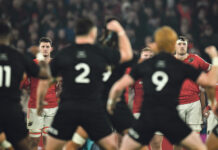TONIGHT, Friday October 30, at 8pm, South Africa will face Argentina in the Bronze Final of the Rugby World Cup at the Olympic Stadium in London. The man in charge of events on the field will be former Shannon RFC and Munster player John Lacey. Lacey’s rise to the top of the Rugby referee pyramid has almost copied his style of play during his career, effortless to the uneducated eye.
With the Rugby World Cup coming relatively early in Lacey’s refereeing career, it is important to find out how it all began and where John sees the game going from here. It’s been a fun journey from the Junior Cup to the World Cup as told by John to our Sports Editor Donn O’Sullivan.
DOS – How did it all begin?
JL – “I was in my office in Thomond Park working away and Gerry Moore who worked in the office next door came in and said “We have a bit of a problem” – the referee, through an administrative error, had failed to turn up for the Junior Schools Quarter Final between St. Munchin’s College and CBC Cork. Gerry said, with 1500 people after paying through the gate, we don’t want to be handing the cash back to everyone. (Lacey laughs) So he said ‘Any chance you’ll help us out?’
“I was a little bit reluctant but with Gerry’s powers of persuasion, I just decided to go out and give him a dig out. I would have done the referee courses through my own development in my coaching job. So, I went out and reffed the match and made a few errors that nobody noticed, thanks be to God, but overall it went really well. I suppose my pace and game knowledge helped. I got a few technical things wrong but nothing that affected the result of the match or anything like that so, the following day then there was a match report which should have been more about the kids but was more about me, including a photograph of me reffing the match and then obviously David McHugh and the IRFU were trying to get me to go refereeing anyway so that was the kind of, initiating block – I won’t say pressure but more…persuasion for me to give refereeing a shot so, that was the catalyst for me going refereeing”
DOS – Did you enjoy it immediately or did you grow into the enjoyment of it?
JL – It’s a good question and one I get asked a lot. I used to ref training so I would have done that a lot with my own squads and I always found I was very attached to that game, which was the closest feeling you could get to actually playing. So, even if it was only a training match before I became a referee, I always used to enjoy the participation side of it. I think if you’re a rugby player, you like being involved in the game and referee becomes part of the game. As a coach you’re not a part of the game, you’re on the sideline, you’re emotionally attached to it but you’re not physically engaged in it at all so from that point of view, I loved it right from the start.
The only slight difference that I found, which I needed a bit of getting used to in the beginning, was there was going on the bus with 25 of my teammates, going away playing a match. Win, lose or draw, getting back on the bus camaraderie, beer on the way home, bit of a sing song, night out and back to training for the next match. That life changed, in terms of locally first and then nationally I was driving on my own to St. Mary’s in Dublin to referee St. Mary’s v Terenure, on your own, go to the bar after where one or two people you might know, luckily enough because you played against them might come up and talk to you but generally, not very much and then you’re into the car, driving back down to Limerick on your own again. I won’t say it’s lonely – I’m not trying to paint that picture, but it is different. It’s definitely different. But, that again changes when you go up the ladder because you’ll have assistant referees that will travel with you to European games so that’s really enjoyable. You can go with a team of Irish lads that are there to support you and go and do a good job in the match, have a nice meal in Toulouse and a bottle of wine afterwards and come home the following day. That’s a great buzz.
DO’S – To the outsider looking in, it seems to have happened very quickly for you, compared to other referees – would you say that?
JL – Yeah, in terms of trying to get to a World Cup, I don’t know is there a record in that but it would be pretty quick the way I’ve gone but in the earlier part, I put an awful lot of effort in. I was used to training 3-4 times a week and playing a match so the first year I refereed I did 2 or 3 matches per week which is probably not normal but I wanted to, because I was 33/34 I hadn’t time on my side like a 23 or 24 year old would have loads of time. If I was gonna get to the World Cup when it was in England, I was gonna have to work hard so I did that. I reffed a Schools game Wednesday, I’d some very good local assessors from the MAR who helped me out and then whatever I would mess up on Wednesday I’d fix on Saturday. Saturday to Sunday. Sunday to Wednesday, Wednesday to Saturday and I literally did about 70 – 80 games in the first season which is probably double or triple what some did and the reason was to try and accelerate my development and obviously, went into the All Ireland League panel. More assessors nationally, international assessors giving me brilliant feedback and then obviously Dave McHugh and Eoin Doyle the two of them specifically really were tough on my but in a really positive coaching way and the two of them had a huge influence, especially when I started getting near the serious stuff, their experience in the development pathway within the IRFU is exceptional and in world refereeing it’s renowned that the Irish referees are really up there.
DO’S – Did you get nervous in your first international match and, what was it?
JL – I’ve spoken to the Munster Sports Psychologist about this and every time you move up a level in sport, it’s natural to be a little bit anxious, a little bit apprehensive and I was no different. It’s a natural thing for players to feel the same way, it was the same when I was playing, moving up to Munster, your first Heineken Cup game, of course you’re gonna be a bit nervous and it was the same for me as a referee I suppose, I was glad of having experienced it as a player but the difference in that is you’ve 14 other guys to share that anxiety with. You could say that you have your Assistant referees but you don’t really, you’re on your own with 30 guys ready to go to battle and you’re out in the middle of stadiums that are full. I think experience…the more you do, the less you worry about those outside factors and I think, you just get into a routine and that helps.
The first international, it’s something that you want to get but you want to get and then move on. I remember Alain Roland and Dudley Philips,were the two Irish touch judges with me for France versus Samoa in the Stade de France which was my first one. The pitch was destroyed, they’re two tough teams to referee at the best of times and they went at each other hard the same night. I remember Alain Roland said post match “You did a good job and that’s one of the toughest test matches I’ve seen in a while” And for that, coming from him, who’s one of the best referees on the world, who’s reffed some of the toughest matches in the world and realise that he thought it was a tough game was great.
DO’S – What is a big match day like for a referee? What’s the routine?
JL – First of all. It depends on the kick off time – everything is related to that. Tonight’s game is 8 p.m. kick off so I believe we’re being transported from the centre of London from our hotel, out to near the Olympic Stadium, so we can relax, have a bite of lunch, go for a coffee, have our team of 4 meeting; Referee, TMO, two touch judges. Maybe an afternoon nap in the evening for the night games because I normally go to bed at 10 o’clock so…I need to get an afternoon nap in case I get a bit dozy around 10 o’clock! So, that will be the day. Everyone’s individual then in terms of what they eat etc. Personally, I like to eat a lot during the day and then 3 or 4 hours before kick off, I won’t bother. I’ll drink some water and then I’ll take little snacks when I arrive. I might take one small sandwich or something like that but I like to have the heavier meals out of the way so I don’t feel too heavy. But some people have to eat 2 and a half hours before a game and eat loads to get though it.
DO’S – We don’t see any of the backround (captains / coin toss etc) on TV, you come out mic’ed up and ready to go…is there a huge amount involved in pre-kick off?
JL – It’s no different to the AIL, it’s just more formal. Or, everything is done to the minute but it’s the same things are done. Studs are checked, front rows are spoken to, the ref gets his briefing the very same as an AIL match. Obviously, you do a proper warm up, again that’s individual. Often times, the ref and the assistants will be doing three different things so you just do whatever gets you ready for that kick off. Then TV coin toss is done by referee and that’s it, we just wait until we’re called by TV and for those type of games we’re out first, the two teams get a two minute and then a one minute call and then they go out and away we go. You wait for the assistant refereee to give the referee a nod from the TV director that we’re good to go so we’re back from the ads and then it’s just game on. Obviously, you have the technology as well so that takes a little bit of our time, in terms of the vests obviously if you’re refereeing you have ref-cam and bits and pieces so we have two technicians in there for communication purposes. One for Ref-cam and one for our Audio that we can communicate with so it is quite busy. There’ll be 4 or 5 people in the dresssing room – a masseuse, a referee liaison officer, TMO, citing officer, match director, so you can be – in a weird way it can be nearly as many as a time but as kick off gets nearer these people tend to disappear.
DO’S – Everyone is human, even referees, is there a point in the game where you might go, “I got that wrong” Are you conscious sometimes of “I’m having a mare here” or are you conscious of “this is going well”?
JL – You are. Maybe not a mare but if you feel that you’ve made one or two calls that are not quite on the money you just have to work harder for that next block. Sometimes, with the screens in the stadiums, you can make a call and then look up and think “Jesus…he knocked it on”… but you’ve just gotta park it and move on, you can’t make another decision to rectify that one, you just have to swallow it. Sometimes if you make a mistake, didn’t play an advantage there or made a slight mistake, personally, I like to say to the players “sorry lads, I got that wrong”. Professional players understand, they prefer the honesty and it’s something that I do, I’ll say “Sorry lads, I should have played advantage there” and they’ll say “no bother ref”, you just get on with it. I think if you don’t acknowledge it, that can possibly annoy them more.
DO’S – What was the best match you’ve refereed? That you enjoyed the most.
JL – Obviously the international matches, I have always wanted to referee England v France – It’s on my list of matches that I’ve always wanted to referee…it’s just one of those games. Of course, I’ve always wanted to ref the All Blacks v France, they are just bucket list matches. If you were ever to get one. I suppose the most exciting game I ever reffed, in the way of scores was Racing Metro 92 vs Edinburgh – 39-37 in Murrayfield. There were 12 tries I think and all 13 conversions were kicked and Hernandez missed the drop goal in front of the posts to win the match for Racing 92 and I think they said it was the “greatest game never shown on Sky’ and I have a copy of that match because it was such a special one.
DO’S – What’s the weirdest thing you’ve seen on a rugby pitch as a ref?
JL – It would have to be, without a doubt, in a match between Saracens and Albi in the Challenge Cup a few years ago and it was a terrible wet night. There was a Garryowen put up near the touchline. Two players went for it and my Assistant referee, Alan Rogan, got too near the players and they crashed into him. He broke his nose in three places and landed in a pond of water on the running track. So, when I went to the captain, Steve Borthwick, to say that we’d need time off for a substitution, he asked me if it was one of his players and I had to say no, it’s one of mine, it’s my assistant referee and we both started laughing! So, I think that will be up there with one of the funnier moments.
DO’S – What’s in the water, firstly in Limerick, and then Ireland. George Clancy, Peter Fitzgibbon, Alain Roland etc. Top class referees
JL – Yeah, we’ve Andy Brace, we’ve Leo Colgan, all these professional referees from Limerick. People often ask me the question and I say if you can ref a tough match in Limerick you can ref anywhere in the world! And, I say it kind of as a joke but there is a really strong rugby ethic in Limerick. There’s passionate people, passionate games, and it’s a great learning base for a referee to develop these skills in tough environments so I think if you can survive the Limerick test you can move on.
For more on becoming a referee see http://mar.ie/


